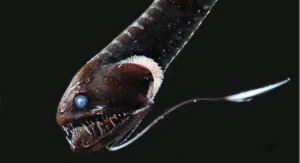A team of marine biologists has discovered 16 species of “ultra-black” fish that absorb more than 99 percent of the light that hits their skin, making them virtually invisible to other deep-sea fish.
The researchers, who published their findings Thursday in Current Biology, caught the species after dropping nets more than 200 meters deep near California’s Monterey Bay. At those depths, sunlight fizzles out. That’s one reason why many deep-sea species have evolved the ability to illuminate the dark waters through bioluminescence.
But what if deep-sea fish don’t want to be spotted? To counter bioluminescence, some species have evolved ultra-black skin that’s exceptionally good at absorbing light. Only a few other species are known to possess this strange trait, including birds of paradise and some spiders and butterflies.

(The Pacific Blackdragon. Photos credit: Karen Osborn/Smithsonian)
UFO Sightings Are Rising Substantially (infographic)
When researchers first saw the deep-sea species, it wasn’t immediately obvious that their skin was ultra-black. Then, marine biologist Karen Osborn, a co-author on the new paper, noticed something strange about the photos she took of the fish.
“I had tried to take pictures of deep-sea fish before and got nothing but these really horrible pictures, where you can’t see any detail,” Osborn told Wired. “How is it that I can shine two strobe lights at them and all that light just disappears?”
After examining samples of fish skin under the microscope, the researchers discovered that the fish skin contains a layer of organelles called melanosomes, which contain melanin, the same pigment that gives color to human skin and hair. This layer of melanosomes absorbs most of the light that hits them.
Read more: Big Think
Ask me anything
Explore related questions




